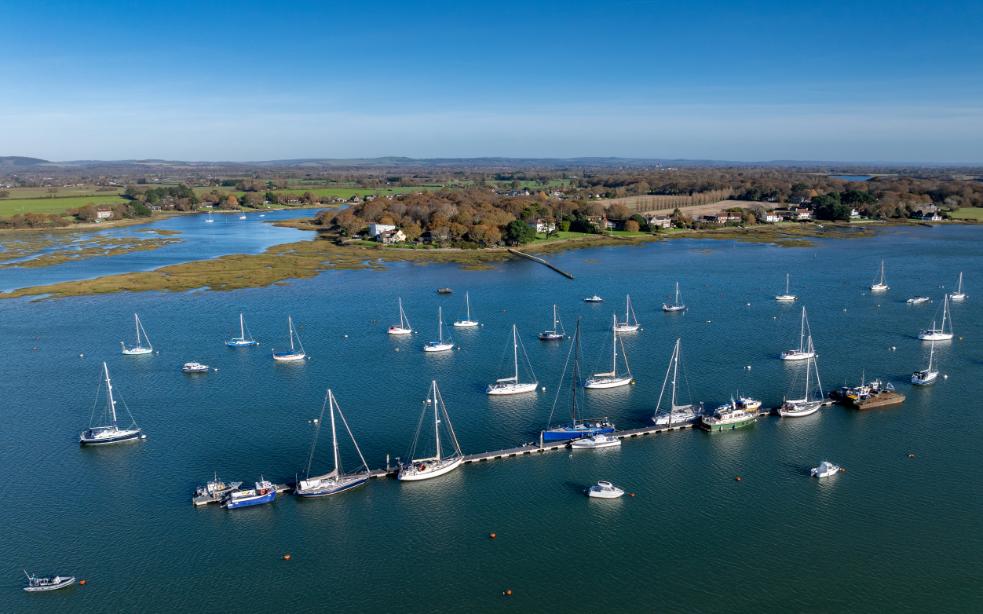Efforts to protect and restore the natural beauty of Chichester Harbour took another step forward last week when key stakeholders gathered at the latest Chichester Harbour Action Summit.
Senior figures from a range of influential organisations came together for their bi-annual review of progress on projects to reverse the environmental decline of the harbour identified in the ‘Condition Review’ carried out by Natural England in 2021.
Meeting attendees included senior representatives from the Environment Agency, Natural England, Southern Water, Havant Borough Council, Chichester District Council and Chichester Harbour Trust. The meeting was chaired by Matt Briers, CEO of Chichester Harbour Conservancy.
Positive Change
Matt Briers said “The power of this forum is to bring together key stakeholders who have the capability to implement positive change for the harbour. We can also collectively align initiatives and working groups, so that we can together address the harbour’s challenges more effectively.”
Southern Water’s Director of Environment & Innovation, Nick Mills shared the progress made on sealing public and private sewers in villages to the North and East of Chichester including East Dean, Charlton, Singleton, Funtington and West Ashling. These areas historically experience high levels of groundwater during the wetter months of the year. Excess ground water under pressure forces its way into the public and private sewage network through joints in the pipe overloading the sewage system. This can then lead to storm overflows into Chichester Harbour. Whilst progress has been made, there is still a long way to go.
Commenting on work to reduce excess ground water from entering the sewage system, Matt Biers said, “these projects demonstrate the necessity of taking a catchment wide approach to reducing storm overflows into Chichester Harbour. Ground water from an area extending as far as the South Downs infiltrates natural and man-made drainage systems leading into the harbour. Therefore, if we are to make a difference, we must take a wider catchment area view and that means engagement across traditional boundaries.”
New Research
PhD student Natalie Huckle, who is co-sponsored by Chichester Harbour Conservancy, shared the early finding of her current research which examines the causes of deterioration of coastal ecosystems and evaluates restoration potential. Once completed the research will be valuable in shaping the Seagrass and Oyster restoration strategies in the harbour.
The meeting heard that work is underway led by the Environment Agency to initiate funding for a Chichester Harbour Investment and Adaption Plan (CHIAP). Once developed the plan will become the roadmap for the future of the area, articulating the sea defences that must be maintained, straightened, or removed, as the Harbour adapts to the two challenges of sea level rise and biodiversity decline. Nature-based solutions to these issues will allow space for new tidal habitats to emerge in years to come.
Despite the work of stakeholders, the environmental state of Chichester Harbour remains of huge concern. The effects of pollution and habitat decline have been well-publicised and recent research from Project Spotlight raised yet another red flag over contaminants of emerging concern adversely affecting the ecological health of the harbour. Matt Briers commented that, “Changes to government policies will be required to make the significant behavioural changes by both organisations and people to reverse the decline. We, as a co-ordinated interest group, need to propose those ideas as they will be essential in delivering our long-term goals of regeneration and harbour health.”
Nick Backhouse, chair of the Chichester Harbour Trust said, “Having kick-started the Action Summit in 2021 following the State of the Harbour report, we are encouraged to see the gathering momentum from all parties in addressing the challenges. There is still a way to go, but by working collaboratively we are starting to make meaningful positive change for the Harbour”.
Find out more about factors affecting water quality in Chichester harbour.
